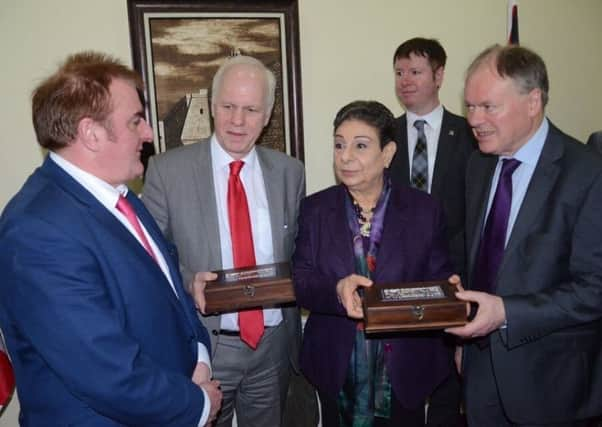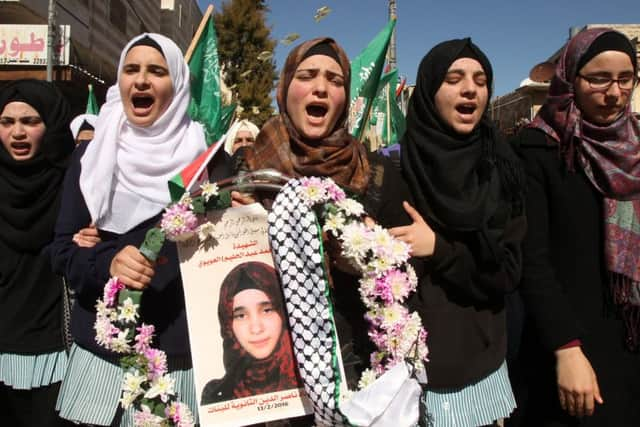Tommy Sheppard MP: Bleak view from the West Bank


Following the Oslo Accords of 1994, the occupied West Bank was divided into three zones. Area A comprised the main town and cities under the control of the new Palestinian Authority. Area B was the remaining small towns and villages where the PA provided civil administration, but the Israeli army remained in charge of security. Area C comprised the rest. Here the Israelis remained in charge of both civil and military affairs.
The Oslo agreement had foreseen the transfer of areas B and C to the Palestinian Authority and the creation of an independent Palestine within five years. But by the turn of the century things were moving backwards, with zoning arrangements now being used to enforce the occupation and Israel actively building Jewish settlements throughout the West Bank, looking for all the world like a process of colonisation.
Advertisement
Hide AdAdvertisement
Hide AdThere are three layers to the occupation. The first is physical. Israeli settlements are the most obvious aspect: huge conurbations of modern houses and apartment blocks cover many hilltops, complete with roads, schools, clinics, leisure facilities and shops. Mortgages and rents are heavily subsidised by the government to encourage people to move. Each settlement has security funded by the Israeli taxpayer and has the army on call if needed.


The other glaring physical presence is the wall; a monstrous feat of engineering which affronts the landscape almost everywhere you travel. Over 700 kilometres long and built from 12-metre-high concrete panels bolted together, it provides a physical separation barrier between Israel and the Occupied Territories.
Add to this a range of permanent checkpoints and more than 700 temporary military checkpoints and the physical presence is awesome. The checkpoints afford a way of re-enforcing authority, a constant reminder of who is in charge. We heard stories from young people about being treated in ways designed to humiliate. One told us how a soldier asked him to hold a piece of card saying “Happy Birthday Uncle” so the soldier could photograph it and send his uncle a special birthday greeting. He refused. Then he was made to pose for the snap at gunpoint.
The second dimension to the occupation is bureaucratic: a vast array of permits, controls and licences are required to build, move, or work within the Occupied Palestinian Territories (OPT). This is where the zoning agreed in Oslo has now been put to the opposite effect of that intended. The only way expanding Palestinian towns and cities can grow is to build in Area C. For that an Israeli permit is required and only 3 per cent of such applications have been approved.
Denied permits, Palestinians have gone ahead and built anyway. Now the authorities are issuing demolition orders like there’s no tomorrow. They have no time limit; they could be executed in days, weeks, years or never. But the bulldozers do come and for many people their day starts by looking out the window to see whether today will be the day.


In almost every area of municipal administration the occupying authorities have found ways to subjugate and discriminate against the Palestinians. Drive through East Jerusalem and you’ll notice the rubbish piled up and rotting in some areas. This is not because Palestinians wantonly destroy their environment but because the refuse lorries won’t pick it up saying it is too dangerous.
The third layer of control is military. There are two systems of justice in the Occupied Territories. Israeli civil law extends only to the settlers who are Israeli citizens. The Palestinian population is covered by military law and a system of military courts where the rights of defendants are weaker and the punishments harsher. More than half of all Palestinian males have been inside an Israeli jail. Hamdi, one 20-year-old we met in East Jerusalem, had been imprisoned 28 times – mostly for organising peaceful protests.
There is widespread concern at how the military court system works, particularly for children. Palestinians are arrested in the night, handcuffed, hooded and thrown on the floor of a military vehicle. Suspects are then questioned without parents or lawyers and kept in detention. After two or three days they are taken to court and for the first time see the lawyer who has been appointed for them. At this stage they will be offered the chance to plead guilty and get a sentence of two or three months. If they wish to plead not guilty, they are told that they will be held on remand until a date for a trial can be set, but this will be at least six to nine months away. Most plead guilty; not surprisingly the courts have a conviction rate of over 99 per cent.
Advertisement
Hide AdAdvertisement
Hide AdLife in Palestine is a sequence of daily subjugation and humiliation. In the face of this it’s quite amazing that there’s not more violent resistance: most people bear the experience with a patience and grace I doubt I could muster myself. The backdrop is increasingly one of despair and hopelessness, compounded by the lack of anything happening that might lead to change. As Nabil Shahh, one of the many senior Palestine Liberation Organisation representatives we met said “for the first time there is no horizon”.
This is the context in which the resistance is rising. Since last October there has been a significant increase in both nonviolent and violent protests. They have been met with disproportionate force; much of it focused around checkpoints. Two days before we visited Hebron two people were killed at the checkpoint which separates the settler enclave from the rest of the old town. One of then was 19-year-old Kilzar Oweiwy, on her way to visit her grandmother. The Israeli army say she was approaching a soldier with a knife. I spoke with her friend, a young man who works in the nearby gift shop. In impeccable English honed through a passion for watching Hollywood movies online he told me: “No way would she carry a knife, she wouldn’t even think of such a thing.”
Around 120 Palestinians have now been shot dead for allegedly attacking soldiers with knifes. Their families claim most were innocent. This is not to suggest that there are not knife attacks by Palestinians on Israelis both military and civilian: there are. But many are now asking what orders the army are operating under and whether these are in fact extra-judicial killings.
Perhaps the most brutal aspect of the military judicial system is the reintroduction of collective punishment – illegal under international law. We visited a family in the Qalandia refugee camp in Ramallah, a sprawling rundown housing scheme. They had been served with a demolition order because their son, without their knowledge, had been involved in a knife attack. The son was killed and now the family were to be evicted and made homeless as punishment. This is meant to convince other families to make sure their kids aren’t involved in the violence, but from what we could see the effect was to push resentment of the occupation forces off the Richter scale.
Israel sees itself as a country and a people under attack. Security dominates all aspects of public policy. The narrative is of innocents under attack from extremists. But the truth is that this is a situation of Israel’s making: everything goes back to the occupation. Allow the creation of a viable Palestinian state on the West Bank and the source of the anger goes away and the prospect of having a neighbour that you can build social, economic and trading links with begins to emerge. That would be the greatest guarantor of Israel’s security.
Israel needs to be persuaded of this course of action. That is why international pressure to end the occupation through targeted campaigns to boycott and divest in those associated with it are so important. It will require international pressure to get peace talks started again. If only the UK could be part of a new international initiative rather than glibly following Prime Minister Benjamin Netanyahu’s every twist and turn.